Sleep masks deliver powerful therapeutic benefits backed by scientific research. You'll experience up to 27 minutes more total sleep time and an 11% boost in sleep quality. By blocking ambient light, these masks enhance melatonin production, leading to faster sleep onset and deeper rest cycles. They're proven to improve memory retention, reaction times, and cognitive performance while protecting against health risks linked to nighttime light exposure. Regular use helps regulate your circadian rhythm and may reduce risks of diabetes, obesity, and depression. To maximize these benefits, choose a mask that fits comfortably and maintain it properly. The science behind sleep mask therapy reveals even more impressive advantages.
Sleep Mask Science
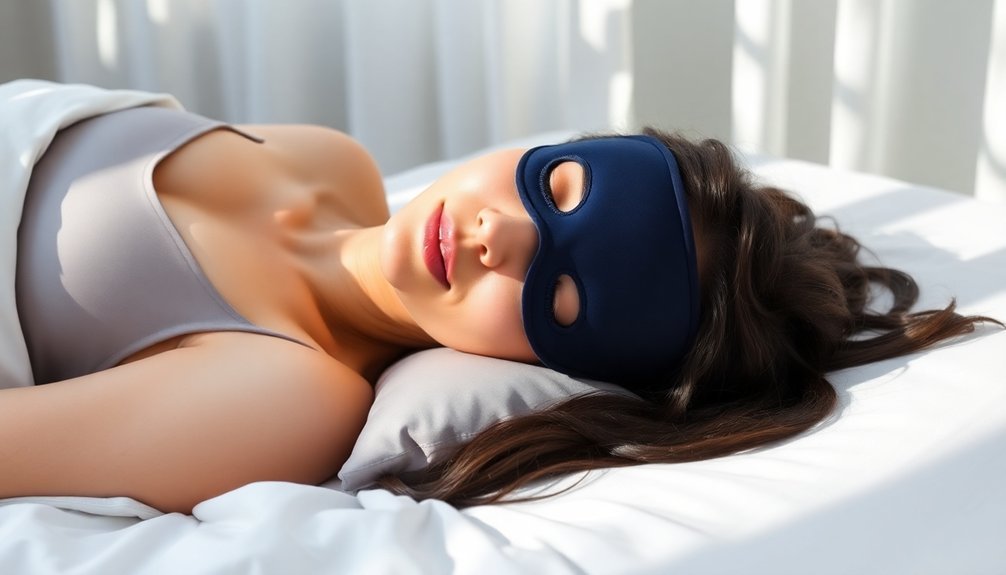
While many people underestimate the impact of ambient light on their sleep, even small amounts of light can substantially disrupt your body's natural sleep patterns. When you use a sleep mask, you're creating the perfect dark environment that your body needs to produce melatonin, the hormone responsible for regulating your sleep-wake cycle.
Research shows that wearing a sleep mask increases your time spent in deep sleep, which directly enhances your cognitive functions, memory consolidation, and overall alertness. A study of 94 participants demonstrated that those who wore sleep masks for just one week showed significantly improved memory retention. You'll also experience improved REM sleep, a vital phase for learning and memory processing.
By maintaining complete darkness throughout your sleep cycle, you're helping your body maintain its internal clock and natural circadian rhythm.
The science behind sleep masks isn't just theoretical – it's backed by extensive user studies across various age groups. Modern sleep masks can achieve complete light blockage, making them an effective and economical solution for protecting your sleep. Whether you're at home or in a bright environment like a hospital, you can use a sleep mask to create the darkness your body needs for ideal rest and recovery.
Eye Mask Health Benefits
Your brain will work better when you use a sleep mask, as it promotes deeper sleep cycles and enhances memory retention.
You'll notice improved alertness and faster reaction times throughout your day due to the mask's ability to block disruptive light and increase REM sleep duration.
Studies show that using a sleep mask promotes melatonin production to help regulate your natural sleep-wake cycles.
Brain Function Enhancement
Blocking light during sleep with an eye mask can substantially enhance your brain function and cognitive performance. When you wear an eye mask, you'll experience improved episodic memory encoding and better performance in learning tasks, particularly when forming new associations.
Your reaction times and sustained attention will also show marked improvement, as demonstrated through psychomotor vigilance tests. Digital light measurements confirm that eye masks effectively block ambient light exposure that could otherwise disturb your sleep quality.
The neurological benefits are significant. Your brain's slow wave activity increases when you use an eye mask, which helps restore its ability to process new information by downscaling synapses. You'll also maintain proper melatonin production, as the mask prevents light from disrupting this essential sleep hormone.
The increased deep sleep you'll get contributes directly to better physical restoration and tissue repair.
You'll notice enhanced alertness throughout your day and improved learning capabilities. Studies show you'll likely experience reduced stress and anxiety levels, leading to better overall neurological well-being.
Since it's such an accessible solution, you can start benefiting from these cognitive improvements immediately, whether you're dealing with irregular sleep schedules, frequent travel, or simply want to optimize your brain function.
Sleep Quality Improvements
Sleep masks deliver measurable improvements to both sleep duration and quality, boosting total sleep time by roughly 5.5 hours per month.
When you wear a sleep mask, you'll experience an additional three minutes of deep sleep each night, which is essential for physical restoration and recovery. Research shows users experience a 32% reduction in movement during sleep, leading to more stable rest patterns.
The benefits extend beyond just duration – you'll notice an 11% improvement in perceived sleep quality and feel 14% more rested upon waking.
You'll find it easier to fall asleep, with users reporting a 10% improvement in sleep onset. The mask's ability to block light enhances your body's natural melatonin production, leading to more consistent sleep cycles and improved REM sleep.
This translates to a 9% boost in next-day recovery, helping you feel more energized and alert.
The mask's effectiveness stems from creating an ideal dark environment that supports your circadian rhythm. You'll experience fewer sleep disruptions throughout the night, as evidenced by decreased wake-after-sleep-onset (WASO) periods.
This combination of deeper sleep stages and reduced interruptions creates the perfect conditions for restorative rest, ultimately enhancing your overall sleep experience.
Circadian Rhythm Regulation
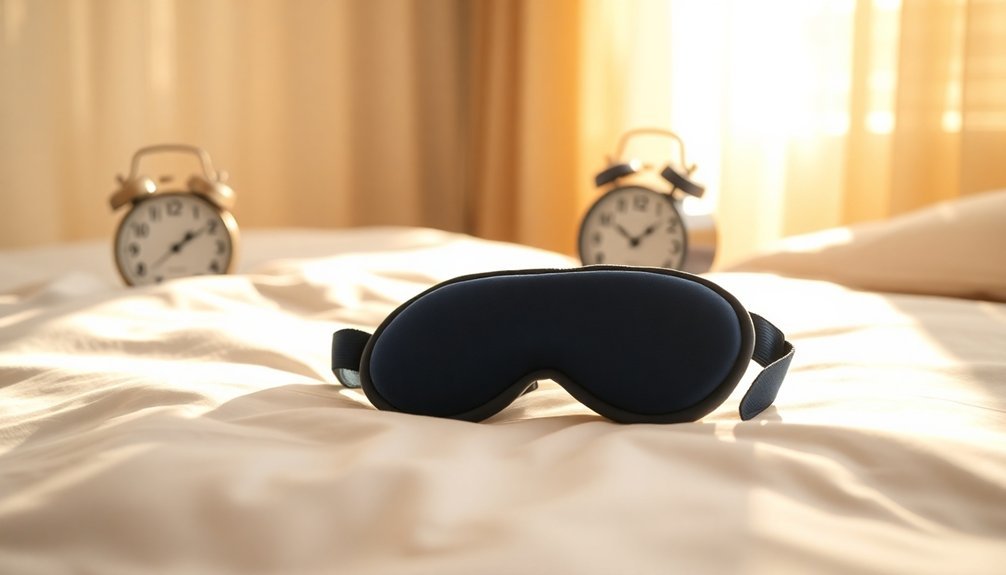
Light-dark cycles serve as the foundation of our body's internal clock, making circadian rhythm regulation an essential aspect of sleep mask therapy. Your circadian system responds powerfully to light exposure, which can either align or disrupt your natural sleep patterns. Recent research shows that personalized light programs can significantly improve alertness during night shifts.
Advanced sleep masks, like the Lumos Smart Sleep Mask, help regulate your circadian rhythm by emitting precisely timed light pulses during sleep, effectively inducing phase shifts when needed.
- Helps maintain ideal melatonin and cortisol levels, critical hormones that regulate your sleep-wake cycle
- Assists in re-aligning disrupted circadian rhythms caused by jet lag, shift work, or irregular schedules
- Creates an environment that supports natural circadian entrainment through controlled light exposure
When you're dealing with circadian rhythm disruptions, these masks work by complementing your body's natural processes. They're particularly effective for night shift workers and frequent travelers who need to adjust their sleep schedules quickly.
The masking effects provided by sleep masks interact bidirectionally with your circadian system, allowing you to adapt to environmental changes while maintaining healthy sleep patterns. By controlling light exposure, you'll experience improved sleep quality and better alignment with your desired schedule.
Memory and Brain Performance
Wearing a sleep mask doesn't just improve your rest – it actively enhances your brain's cognitive functions and memory processing abilities. Research shows that using an eye mask during sleep markedly improves your episodic memory encoding and helps you perform better on word-pair association tasks. These improvements are directly linked to increased periods of slow-wave sleep that you'll experience when wearing a mask.
You'll notice enhanced alertness and faster reaction times in your daily activities after sleeping with an eye mask. This improved cognitive performance can make a substantial difference in tasks like driving, studying, or any activity requiring mental focus. The benefits are particularly noticeable in your ability to process and retain new information. By creating a distraction-free environment, sleep masks help prevent interruptions that could interfere with memory formation.
What makes sleep masks particularly effective is their ability to create ideal conditions for memory consolidation during sleep. When you block out ambient light, you're not just sleeping better – you're giving your brain the perfect environment to strengthen neural connections and process the day's learning.
This enhanced memory processing occurs naturally during the longer periods of slow-wave sleep that you'll achieve with a mask, making it an efficient, non-invasive way to boost your cognitive performance.
REM Sleep Enhancement
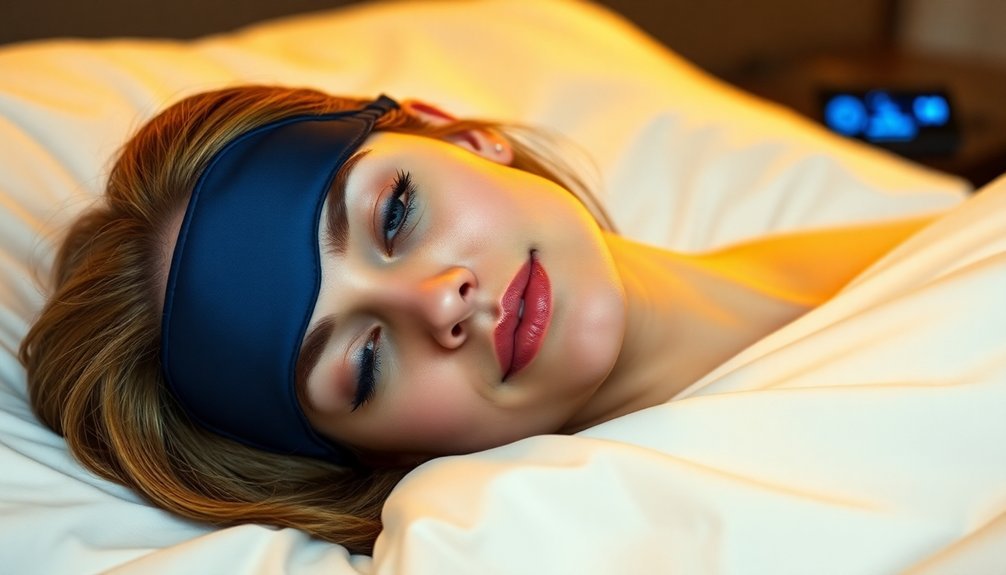
Research shows you'll substantially increase your REM sleep duration when using a sleep mask consistently, with studies revealing improvements in both sleep quality and recovery metrics.
Your brain enters deeper sleep stages more efficiently with a sleep mask, as the complete darkness maximizes melatonin production and strengthens your natural sleep-wake cycle.
When you block out ambient light with a sleep mask, you'll experience longer periods of uninterrupted REM sleep, which is essential for cognitive restoration and emotional processing. During these enhanced REM cycles, your brain demonstrates wakefulness-like activity while processing complex information and consolidating memories.
REM Duration Research Data
Recent sleep-science breakthroughs have demonstrated the remarkable impact of sleep mask therapy on REM sleep duration and quality. Research confirms that wearing a sleep mask can substantially improve your REM sleep percentage and overall sleep quality.
You'll experience enhanced melatonin production when using a sleep mask to block out light, leading to more consistent and restorative sleep cycles. Like patients in clinical studies who experienced increased REM sleep by 17.8%, consistent sleep mask use can significantly boost your REM sleep percentage.
Studies specifically highlight three key benefits of sleep mask therapy:
- You'll spend approximately 3% more time in bed and sleep 3% longer compared to nights without a mask
- Your working memory performance will improve due to increased REM sleep duration
- You'll experience better sleep continuity and normalized circadian rhythms
Clinical data shows that sleep masks combined with vibration therapy deliver even better results than standard masks alone. When you block ambient light with a sleep mask, you're helping your body maintain its natural melatonin production cycle, which directly influences REM sleep expression.
This intervention proves particularly effective for people experiencing reduced REM sleep duration or those exposed to disruptive environmental factors. The research demonstrates that consistent sleep mask use can help reset your circadian rhythms and optimize your cognitive function through enhanced REM sleep.
Sleep Stage Quality Benefits
Through extensive clinical observation, sleep stage quality dramatically improves when you incorporate sleep mask therapy into your nightly routine. You'll experience a significant 12.9% increase in REM sleep, which is essential for your physical restoration and mental well-being.
By blocking artificial light, sleep masks help regulate your circadian rhythm and boost melatonin production naturally.
When you use a sleep mask consistently, you'll notice enhanced sleep stage regulation and improved deep sleep periods. These improvements directly impact your daytime functioning, reducing anxiety and stress levels. Research data from WHOOP members confirms a 2% gain in REM sleep, supporting the practical benefits of sleep mask therapy.
The effectiveness of your sleep mask depends on its design and your comfort level. Look for masks with hollow eye cavities to maximize comfort while maintaining complete darkness.
You'll get the best results by combining sleep mask usage with other sleep-enhancing strategies, such as maintaining a consistent bedtime routine. The beauty of sleep mask therapy lies in its simplicity – it's an accessible, non-invasive method to optimize your sleep stages and enhance overall sleep quality.
Light Blocking Technology
Modern light blocking technology has revolutionized sleep mask therapy by offering complete darkness during rest periods. This advanced technology doesn't just block artificial light; it actively promotes your body's natural melatonin production and helps regulate your circadian rhythms, leading to markedly improved sleep quality.
- Increases REM sleep by up to 12.9%, enhancing your cognitive function and emotional well-being
- Features zero-pressure eye cavities and breathable materials for maximum comfort during extended wear
- Incorporates adjustable straps and contoured designs to prevent light leakage while maintaining comfort
When you're using a sleep mask with advanced light blocking technology, you'll notice immediate benefits in your sleep onset time and overall rest quality. The technology is particularly beneficial if you're a shift worker, frequent traveler, or day sleeper.
Today's masks often include sophisticated features like adjustable LEDs that simulate natural sunrise and sunset, helping reset your internal clock. Research shows that consistent use of light blocking sleep masks can substantially lower your cortisol levels while boosting melatonin production.
This technology has proven so effective that it's now commonly used in medical settings like ICUs to improve patient recovery through better sleep quality.
Choosing Your Sleep Mask
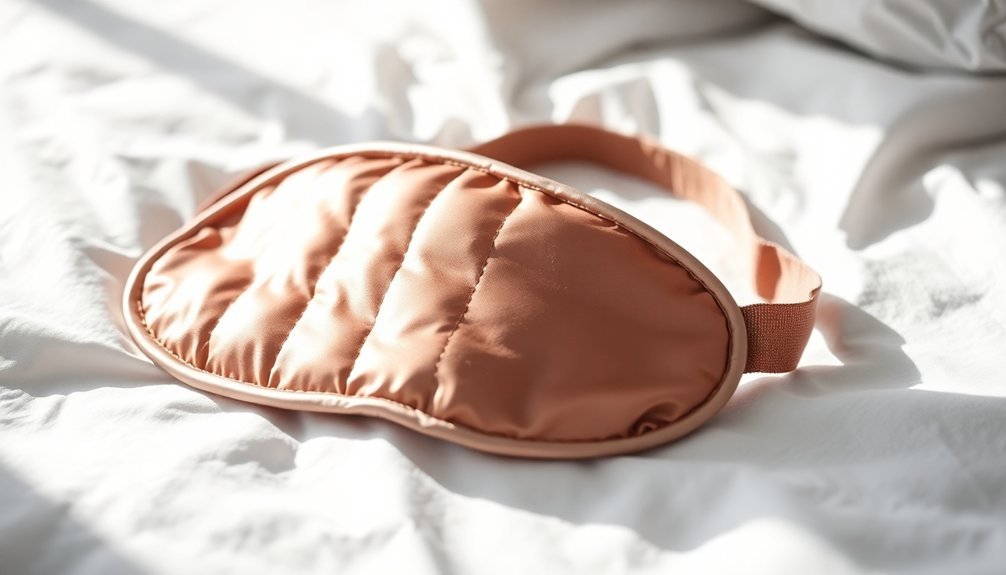
With light blocking technology advancing rapidly, selecting the right sleep mask has become more complex than ever. Your choice should align with your specific needs, sleeping habits, and comfort preferences.
| Material | Benefits | Best For |
|---|---|---|
| Cotton | Breathable, affordable, easy care | Heavy sweaters, budget-conscious |
| Silk | Luxurious, hypoallergenic, skincare benefits | Sensitive skin, anti-aging focus |
| Satin | Balanced features, durable, good value | All-around use, moderate budget |
| Memory Foam | Contoured fit, pressure-free | Side sleepers, full darkness |
| Smart Fabric | Tech integration, audio features | Tech enthusiasts, travelers |
When choosing your mask, consider three key factors: material, design, and special features. If you're a side sleeper, look for C-shaped eye cups and adjustable straps. For sensitive skin, opt for hypoallergenic materials like pure silk. Travelers and shift workers should prioritize 100% blackout capabilities and portability.
The design should provide zero pressure on your eyelids while maintaining complete darkness. If you're interested in additional features, some masks offer built-in audio capabilities with 20+ hour battery life and adjustable speakers. Consider your primary use case – whether it's for daily sleep, travel, or shift work – to make the most informed choice.
Proper Care and Maintenance
Keeping your sleep mask clean through regular washing with mild soap and warm water helps prevent skin irritation and bacterial growth.
You'll extend your mask's lifespan by handling it gently, avoiding harsh chemicals, and keeping it away from direct sunlight.
When you're not using your sleep mask, store it in a protective case to shield it from dust and maintain its shape.
Cleaning Your Sleep Mask
Proper maintenance of your sleep mask plays a vital role in its effectiveness and longevity. To guarantee excellent hygiene and performance, you'll need to follow specific cleaning guidelines that protect both the mask's material and your skin's health.
- Regular washing every two weeks for general use, or more frequently if you use it daily.
- Hand washing only, using lukewarm water (no hotter than 77°F) and mild silk detergent.
- Gentle care during cleaning, avoiding any twisting or wringing of the fabric.
Start by checking your mask's care label for specific instructions.
Fill a basin with lukewarm water and add a small amount of silk-specific or mild detergent.
Soak your mask for 3-5 minutes, then gently clean it without twisting.
Rinse thoroughly under cold water until you've removed all soap residue.
To dry, either lay it flat or hang it away from direct sunlight.
Never use a machine dryer or harsh chemicals like bleach, as these can damage the fabric.
If you have sensitive skin or allergies, you'll want to wash your mask more frequently.
For storage, keep your mask in a clean, dry place away from moisture and direct sunlight to maintain its quality.
Extending Mask Lifespan
A well-maintained sleep mask can last up to and beyond a year when you follow essential care practices. To maximize your mask's lifespan, handle it gently during cleaning and adjustments, avoiding excessive stretching or twisting that could damage the material and elastic bands.
For proper cleaning, use lukewarm or cold water and follow material-specific guidelines. If you have a silk mask, use only mild silk-specific detergents and never apply bleach or fabric softeners.
Clean your mask weekly, or more often if you have allergies, but avoid over-cleaning as it can cause premature wear.
Pay special attention to specialized components like gel inserts and memory foam. Wipe gel inserts with a damp cloth and address memory foam discoloration using a water-vinegar solution.
When drying your mask, gently press it between clean towels and let it air dry naturally, away from direct sunlight.
Make preventive care part of your routine by washing your face before bed to minimize oil transfer. Regularly inspect your mask for signs of wear and address any issues promptly.
Don't iron your mask or expose it to harsh chemicals, as these can compromise its integrity and reduce its effectiveness.
Storage Best Practices
The right storage practices can dramatically extend your sleep mask's lifespan and maintain its effectiveness. Store your mask in a cool, dry place away from direct sunlight and heating vents to prevent material degradation.
Using a breathable storage pouch made of cotton or mesh will promote proper airflow while protecting against dust accumulation.
- Choose a designated storage spot in a quiet, low-traffic area of your home, preferably in a dark dresser drawer or closet
- Keep your mask away from strong-smelling substances, pets, and children to prevent damage or contamination
- Use a soft, padded case with a zipper or Velcro closure for extra protection during travel or storage
When storing your sleep mask, avoid folding or creasing the material, as this can cause permanent damage. Instead, lay it flat in its protective case.
Don't use airtight containers or plastic bags, as these can trap moisture and promote bacterial growth.
If you're using multiple sleep masks, consider creating a dedicated sleep accessories storage area to keep them organized and easily accessible.
Remember to guarantee your mask is completely dry after cleaning before storing it to prevent moisture-related issues.
Travel Sleep Solutions
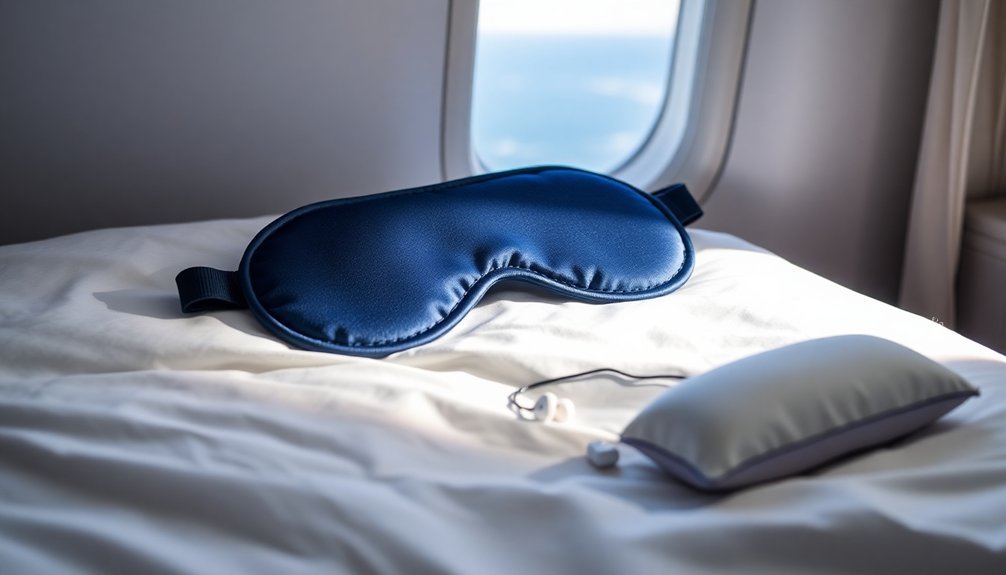
Modern travelers face unique sleep challenges, from noisy airplane cabins to bright hotel rooms. To combat these obstacles, you'll want to assemble a thorough sleep kit that includes essential items for quality rest on the go.
Start with a high-quality sleep mask to block out unwanted light and boost your REM sleep.
Pair it with ANBOW earplugs, which reduce noise by up to 32 decibels, creating a peaceful environment wherever you are.
For neck support, consider the Trtl Travel Pillow with its innovative plastic insert, or the BCOZZY pillow that offers chin support and easy attachment to your luggage.
If you're particularly sensitive to noise, the Yogasleep Portable White Noise Machine provides six soothing sound options, while Bose Sleepbuds II offer up to 10 hours of noise-masking capability.
For complete comfort, don't forget to monitor room temperature and pack sleep socks.
When dealing with jet lag, you might want to incorporate melatonin supplements into your travel routine.
Remember that maintaining a consistent sleep environment is vital, so bringing familiar items from home can help signal to your body that it's time to rest, regardless of your location.
Clinical Research Findings
While travel solutions offer practical ways to improve sleep on the go, scientific research reveals compelling evidence about sleep masks' effectiveness in clinical settings.
Clinical studies have shown that wearing sleep masks can increase your total sleep time by 3%, giving you an extra 5.5 hours of sleep monthly. You'll also gain 3 additional minutes of deep sleep each night, accumulating to 90 extra minutes of quality rest per month.
- Sleep mask usage reduces sleep onset time by 1.4 minutes and decreases sleep disturbances by 19.82 points on the VSHSS scale
- Research demonstrates significant reductions in anxiety levels, with participants experiencing up to 36% lower stress levels compared to baseline
- Clinical tests show improved cognitive performance, including enhanced learning ability and alertness the following day
The benefits extend beyond basic sleep improvements. Studies indicate that sleep masks can increase melatonin levels and reduce cortisol, leading to better overall sleep quality.
In ICU settings, patients using sleep masks showed improved crucial signs, including reduced heart rate and blood pressure. These findings are particularly significant for clinical applications, where sleep quality directly impacts recovery and healing processes.
Advanced Sleep Mask Features
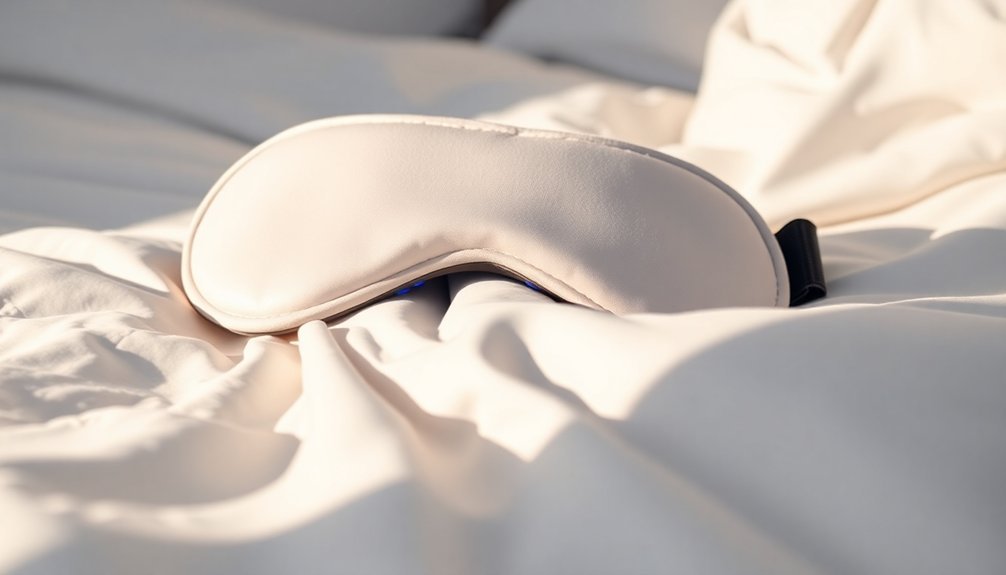
Advanced technology has revolutionized sleep masks, transforming them from simple light blockers into sophisticated wellness devices. Today's smart sleep masks offer customizable light exposure settings and anatomical designs that effectively block light while maintaining maximum comfort through convex dome shapes that minimize eyelash contact.
You'll find these masks equipped with memory foam and ice silk fabrics that adapt to your facial contours, while adjustable retention bands secure them in place without creating pressure points.
The hypoallergenic materials resist moisture and dirt, keeping your mask clean and fresh.
Many advanced models now include built-in audio features for soothing sounds and smart alarms that wake you at the ideal point in your sleep cycle. You can track your sleep patterns through integrated monitoring capabilities that sync with other health devices for thorough wellness insights.
You'll also benefit from innovative features like temperature control functions and strategic acupressure points that promote relaxation.
These masks are designed to be portable and machine washable, making them practical for daily use. Their non-invasive approach works with your body's natural processes, offering a safe alternative to sleep aids.
Frequently Asked Questions
Can Sleep Masks Help With Migraines and Headaches?
Yes, sleep masks can help ease your migraines and headaches by blocking light, providing gentle pressure, and offering cooling relief. They'll improve your sleep quality and reduce pain through light protection and sensory relief.
Is It Safe to Wear Sleep Masks With Eyelash Extensions?
Yes, you can safely wear sleep masks with eyelash extensions if you choose ones with contoured designs and soft materials. Make sure your mask doesn't press directly on your lashes to maintain their integrity.
How Long Does It Take to Adapt to Sleeping With Masks?
You'll likely notice immediate benefits, but full adaptation varies from person to person. While some adjust within a few nights, others may need 1-2 weeks to feel completely comfortable sleeping with a mask.
Can Children Safely Use Sleep Masks?
You shouldn't give sleep masks to children under 6 due to safety risks. For older kids, make certain they can remove masks independently and choose breathable materials. Always supervise their use when starting out.
Do Sleep Masks Work Effectively for Side Sleepers?
Yes, sleep masks can work effectively when you're a side sleeper. You'll want to choose a mask with a slim profile, adjustable straps, and contoured design to prevent light leakage and maintain comfort.
In Summary
You'll find sleep masks are a simple yet powerful tool for improving your sleep quality and overall health. By blocking light effectively, they help regulate your circadian rhythm and boost REM sleep naturally. Whether you're traveling or at home, incorporating a quality sleep mask into your nightly routine can enhance memory, reduce stress, and promote deeper rest. Choose one that fits comfortably and maintain it properly.
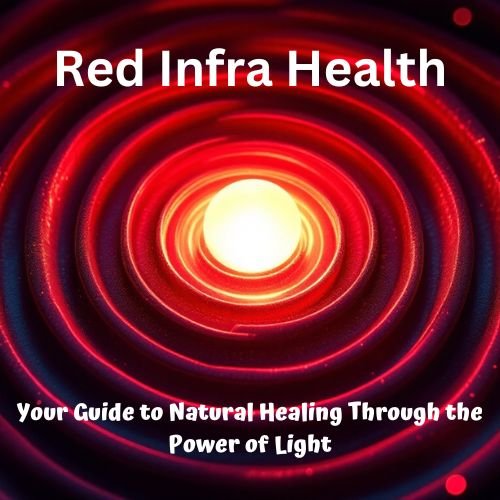
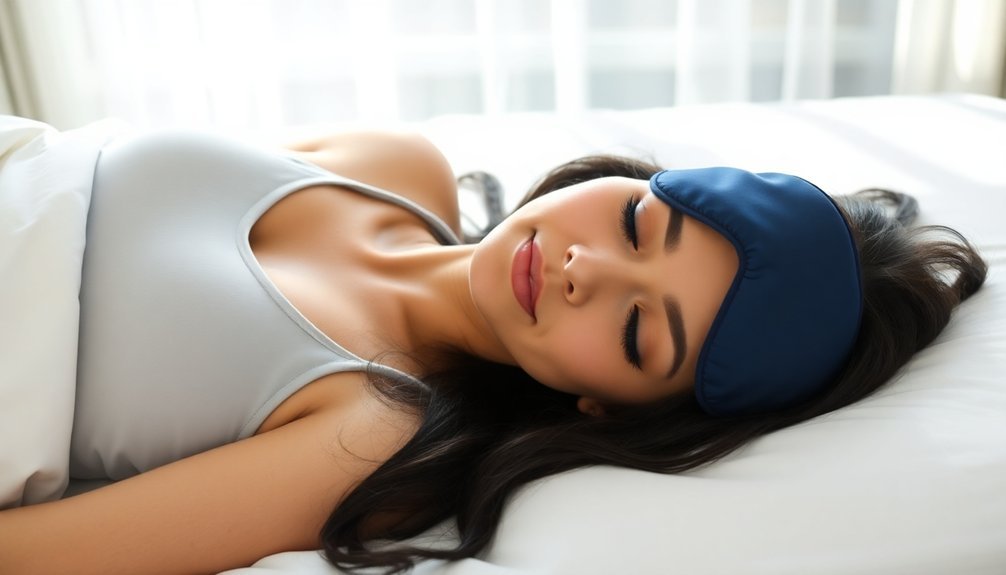

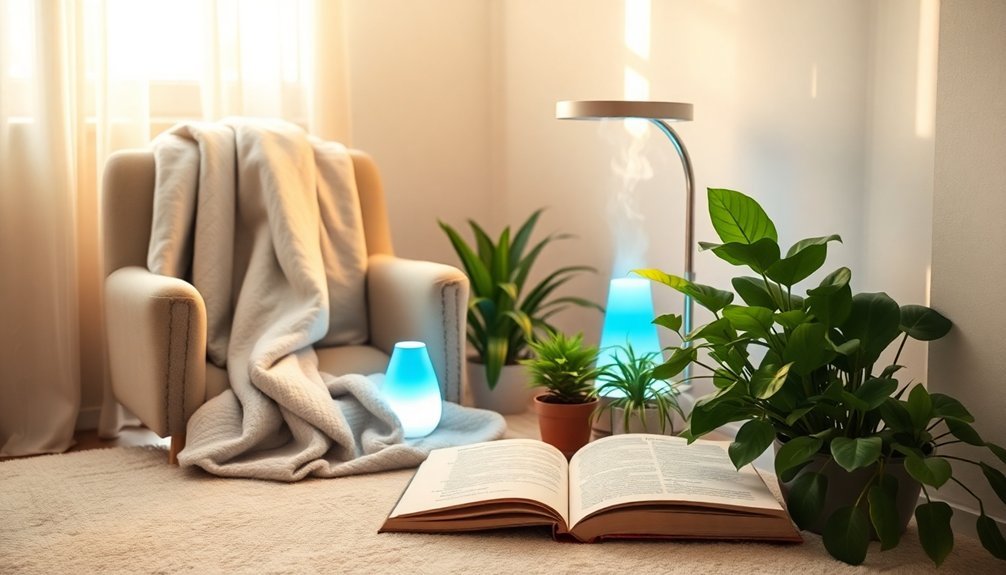
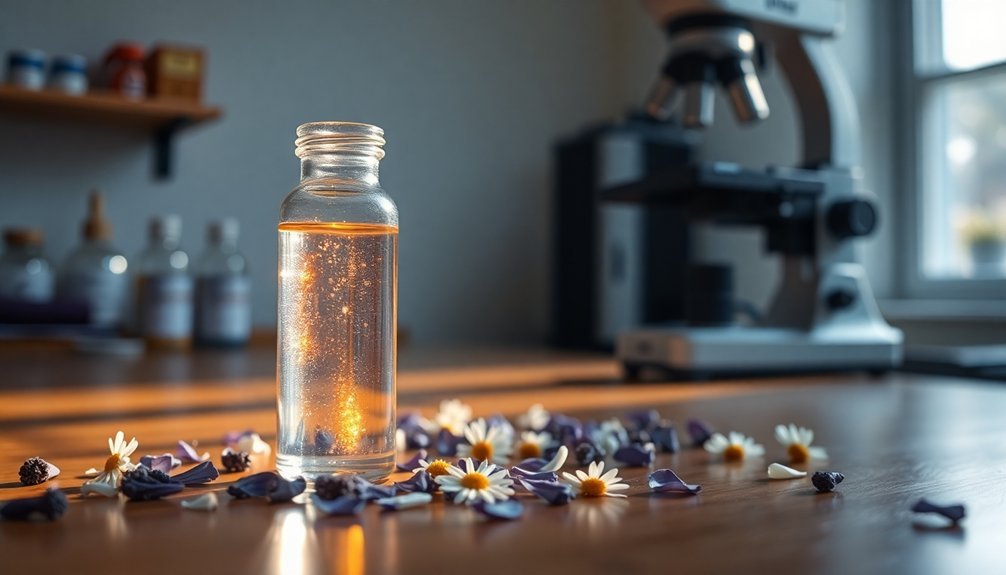
Leave a Reply